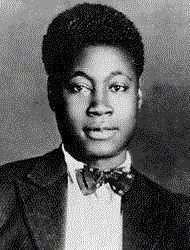|
|
Online Poems |
|
|
Enslaved (1921) by Claude McKay (1889-1948) |
McKay immigrated from Jamaica |
- Oh when I think of my long-suffering race,
- For weary centuries despised, oppressed,
- Enslaved and lynched, denied a human place
- In the great life line of the Christian West; 4
- And in the Black Land disinherited,
- Robbed in the ancient country of its birth,
- My heart grows sick with hate, becomes as lead,
- For this my race that has no home on earth. 8
- Then from the dark depths of my soul I cry
- To the avenging angel to consume
- The white man's world of wonders utterly: [millennialism]
- Let it be swallowed up in earth's vast womb, 12
- Or upward roll as sacrificial smoke
- To liberate my people from its yoke!
Though Langston Hughes is more widely taught, Claude McKay is recognized as the first poet to draw attention to the Harlem Renaissance with publication of Harlem Shadows in 1923. McKay lived most of his life in the USA, but his Caribbean roots and his cosmopolitan lifestyle make him also a significant post-colonial writer.
McKay was born in Jamaica (to parents of African Ashanti and Malagasy descent) and tutored by a white Jamaican who encouraged McKay to write poetry in Jamaican patois (creole language) and helped publish two books of his poetry. In 1912 he left for the United States where he lived in Alabama, Kansas City, and New York, writing and editing for several periodicals, some of them communist or radical. In the 1920s he lived, worked, wrote, and published in England and the new Soviet Union before returning to the USA, where he wrote novels (including the successful Home to Harlem, 1928) as well as poetry. Like many early-20th-century intellectuals, he grew disenchanted with Communism and converted to Roman Catholicism in 1944 before dying in Chicago aged 59.
McKay is an invaluable participant in African American literature and culture but may also represent the important Afro-Caribbean presence in Anglo-American and other literatures and cultures. The leading contemporary theorist of this tradition is Paul Gilroy, author of The Black Atlantic: Modernity and Double Consciousness (1993), Against Race: Imagining Political Culture Beyond the Color Line (2000), and After Empire: Multiculture or Postcolonial Melancholia (2004).
Discussion question(s):
Engage this poem in dialogue with Robinson Crusoe and Walcott's "Crusoe's Island." What different outcomes are imagined for the postcolonial encounter?
![]()
Enslaved
![]()
1921 (The Liberator); 1922 (Harlem Shadows)

—
[ ]

